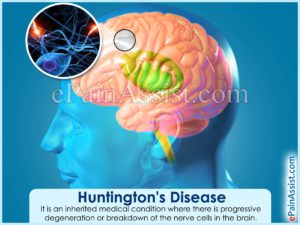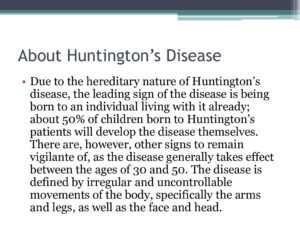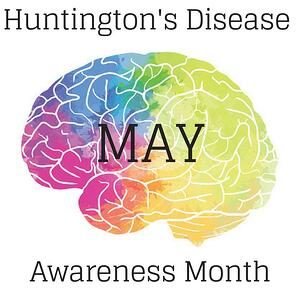Huntington’s disease is an inherited disease that causes the progressive breakdown (degeneration) of nerve cells in the brain. Huntington’s disease has a broad impact on a person’s functional abilities and usually results in movement, thinking (cognitive) and psychiatric disorders.
Most people with Huntington’s disease develop signs and symptoms in their 30s or 40s. But the disease may emerge earlier or later in life.
When the disease develops before age 20, the condition is called juvenile Huntington’s disease. An earlier emergence of the disease often results in a somewhat different set of symptoms and faster disease progression.
Medications are available to help manage the symptoms of Huntington’s disease, but treatments can’t prevent the physical, mental and behavioral decline associated with the condition.
Symptoms
Huntington’s disease usually causes movement, cognitive and psychiatric disorders with a wide spectrum of signs and symptoms. Which symptoms appear first varies greatly among affected people. During the course of the disease, some disorders appear to be more dominant or have a greater effect on functional ability.
Movement disorders
The movement disorders associated with Huntington’s disease can include both involuntary movement problems and impairments in voluntary movements, such as:
- Involuntary jerking or writhing movements (chorea)
- Muscle problems, such as rigidity or muscle contracture (dystonia)
- Slow or abnormal eye movements
- Impaired gait, posture and balance
- Difficulty with the physical production of speech or swallowing
Impairments in voluntary movements — rather than the involuntary movements — may have a greater impact on a person’s ability to work, perform daily activities, communicate and remain independent.
Cognitive disorders
Cognitive impairments often associated with Huntington’s disease include:
- Difficulty organizing, prioritizing or focusing on tasks
- Lack of flexibility or the tendency to get stuck on a thought, behavior or action (perseveration)
- Lack of impulse control that can result in outbursts, acting without thinking and sexual promiscuity
- Lack of awareness of one’s own behaviors and abilities
- Slowness in processing thoughts or ”finding” words
- Difficulty in learning new information
Psychiatric disorders
The most common psychiatric disorder associated with Huntington’s disease is depression. This isn’t simply a reaction to receiving a diagnosis of Huntington’s disease. Instead, depression appears to occur because of injury to the brain and subsequent changes in brain function. Signs and symptoms may include:
- Feelings of irritability, sadness or apathy
- Social withdrawal
- Insomnia
- Fatigue and loss of energy
- Frequent thoughts of death, dying or suicide
Other common psychiatric disorders include:
- Obsessive-compulsive disorder — a condition marked by recurrent, intrusive thoughts and repetitive behaviors
- Mania, which can cause elevated mood, overactivity, impulsive behavior and inflated self-esteem
- Bipolar disorder — a condition with alternating episodes of depression and mania
In addition to the above symptoms, weight loss is common in people with Huntington’s disease, especially as the disease progresses.
Symptoms of juvenile Huntington’s disease
The start and progression of Huntington’s disease in younger people may be slightly different from that in adults. Problems that often present themselves early in the course of the disease include:
Behavioral changes
- Loss of previously learned academic or physical skills
- Rapid, significant drop in overall school performance
- Behavioral problems
Physical changes
- Contracted and rigid muscles that affect gait (especially in young children)
- Changes in fine motor skills that might be noticeable in skills such as handwriting
- Tremors or slight involuntary movements
- Seizures


